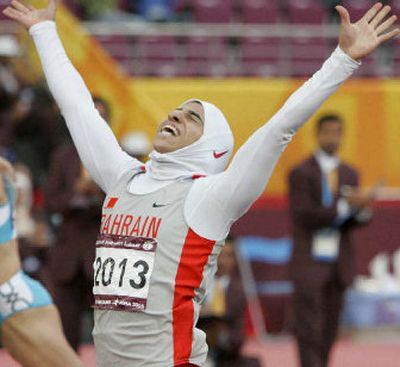True to her faith

DOHA, Qatar – Sprinter Ruqaya Al Ghasara of Bahrain isn’t held back by running in a hijab, a full Muslim headscarf. In fact, she says, it makes her even quicker.
“Wearing traditional Muslim dress has encouraged me. It’s not an obstacle – quite the opposite,” said Al Ghasara, who won the gold medal in the 200 meters at the Asian Games on Monday night in 23.19 seconds.
The bronze medalist earlier in the 100, Al Ghasara is instantly recognizable in her full-length running suit that leaves her hands and face exposed. It’s only traditional in spirit, however: The fabric is clingy and stretchable and her white hajib headwear bears the swoosh trademark of her sponsor.
Al Ghasara said her outfit is a personal choice, although custom weighs heavily. While other Bahraini female athletes compete in the clothing more typical of their sports, many are naturalized Bahraini citizens who were not raised Muslim.
Yet Al Ghasara, who claims U.S. sprinter Marion Jones as a role model, said she hoped her clothing choice would inspire other Muslim women to join competitive sports.
The 15th Asian Games are the first in an Arab state, and Doha officials are using it as a test run to bid for the 2016 Olympics. Other Muslim women have competed in clothes that conform with their traditions, but Al Ghasara has the highest profile.
“Wearing the hijab shows that there are no obstacles. I’ve set my best times wearing the hijab and even qualified for Osaka in it,” she said, referring to the Japanese city which is hosting next year’s world championships.
Although the soft-spoken Al Ghasara gives few details, she didn’t have the easiest path to the top of her sport.
The 24-year-old was a latecomer to track in a nation where women have traditionally been discouraged from competition. Discovering running on her high school track, she was pointed out to Bahraini coach Tadjine Noureddine, who led her to her first gold medals at the 2002 Arab Games in Jordan.
“She has excellent qualities as a sprinter,” said Noureddine, a former hurdler.
“The only problem is that she started late and so we’ve had to work hard with stretching and strength. In Bahrain, sports for women is new, only about 5 years old.”
Training has included psychological strengthening and stretches at high altitude in South Africa, Noureddine said. Through it all, Al Ghasara has stayed mostly injury free, apart from some back problems, he said.
Al Ghasara repeatedly thanked her coach at her postrace news conference. She credits him with more than his understanding of the sport.
“He is Muslim and an Arab so he knows well the Islamic traditions,” she said.